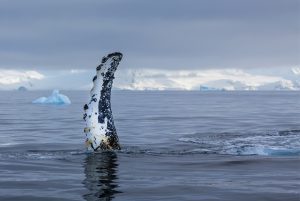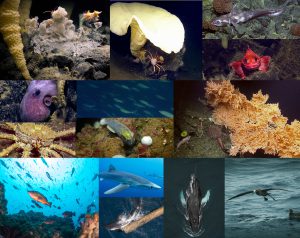Ocean journalist Laura Trethawey’s new book follows those headed out to sea. Packed with high-stakes stories exploring the unexplored, the implications are simultaneously inspiring and dire for both the life of the ocean and those on land.
The Imperilled Ocean: Human Stories from a Changing Sea, published Feb. 4, 2020, looks at the rapidly changing ecosystem of the oceans and the growing migrant crisis, all while humanizing the ocean — which encompasses 71 per cent of the planet.
The novel includes viewpoints of a teenager from Ghana on a life raft in the Mediterranean, a biologist tracking sturgeon in the Pacific Northwest and a community battling eviction, questioning who owns the water in their harbour town.
Below is an excerpt from The Imperilled Ocean.
On eviction day, the Dogpatch was at maximum capacity. Every owner was on board and waiting. It was grey and cold, a shiver of rain sprinkling the water surface. As the day progressed, the sun broke weakly through the clouds. A convivial feeling crept up. For once, everyone was in the Dogpatch for the same reason. People who hadn’t shown their faces in months were on deck, sipping beers and watching for the town’s next move.
Daniel spent most of the day fiddling nervously with Sojourn’s rebuilt engine. That’s how he used to spend his time before he became an unlikely spokesperson for an unexpected movement. He had given up his time, his privacy and his plans, and in the end, those sacrifices hadn’t protected his boat or anyone else’s. If the town came to haul away the Dogpatch boats that day, he wanted to have the engine running so he could make a quick escape and save Sojourn. He squirted more oil into the engine and got back to work.
Throughout the day, a stranger went through the Patch dropping off envelopes with the words “Fight the Eviction” scrawled on the front. When he got to Traci Pritchard’s dock, she told him off for coming aboard without permission, until she saw the envelope. Inside was a letter claiming that the Dogpatch rightfully belonged to a lessor in Calgary who owned the land bordering the water lot. Without that owner’s go-ahead, the letter said, the town had no right to remove boats.
After hours of trial and error, Daniel’s motor finally roared clean and loud. He backed Sojourn out of his boathouse, keyed up and excited. As he rounded the Ladysmith harbour, however, one of the engines failed. With the remaining engine, he turned Sojourn around and took her limping back to the boathouse. A few days earlier, the engine on Daniel’s skiff had also died. Until he found a cheap replacement, he would be stuck paddling around the Patch. A trip to the marina had once taken five minutes; now it took twenty.
Later that evening, Daniel poled his skiff gondolier-style over to Vince Huard’s two strung-together boats. A small party was gathering. Vince had hauled up Dungeness crabs from farther out in the channel, and now he was at the barbecue, slathering them in sauce. As Vince grilled crabs on the deck, Daniel took a seat in the wooden galley. Across from him, Luke English ate a bowl of spaghetti and flipped through a book of knots. Everyone called this 26-year-old, long-haired, tree-planting troubadour Newbie. He had arrived three months ago and knew nothing about boats, but the Patchers liked him all right so far. He set aside the empty bowl and strummed a few chords on his guitar. “I’m a happy noodle man,” he sang to himself. “I’m Italian.”
Outside, the sky faded from blue to pink to black. Vince flicked on his headlamp to watch the crabs turn from grey to red on the barbecue. “You stay as long as you can, and then they will kick you out. Why? ’Cause it’s the best place on the water,” Vince said. “We don’t have rights. It’s all at the whim of when the water lot is sold to someone. Then we gotta go. Meanwhile, we’re gypsies. We gather in an area, hang out together, protect each other, and then eventually we all scatter and find a new place.”
Packing up a subsistence life would be more challenging for the older, the poorer and the disabled in the Dogpatch. If the town removed the three strung-together boats that an eighty-something deaf mariner lived on, where would he go? Or the two hoarders who got by on disability checks? Or Lew McArel, whose monthly $244 welfare check would barely cover food, let alone accommodations, on land. “Go where?” Lew asked. “I’ll just live on the streets.” The townspeople of Ladysmith had legitimate concerns about the Patchers: the way they heated their boats with shoddy wood stoves and their bucket-and-chuck-it approach to sewage. But in trying to deal with abandoned, derelict vessels like the Viki Lyne II, which might or might not have been sinking into the sea, the town threatened the lives of a group of mismatched outcasts who had slipped through the cracks on land and found, if only for a brief time, home.
As cities build a more connected relationship with their waterfronts, will we accommodate people who were living on the ocean before the mainstream rediscovered it? Will we look deeper at their reasons for being on the water? Or will we impose new rules that strip them of a space, and call it progress? The party inside Vince’s boat grew louder, voices and guitar strums ricocheting off the tight interior of the wheelhouse. Outside, the sky darkened and the stars were reflected in the ocean below, creating a 360-degree spin of bright white pinpricks in the jet-black sky. The conversation swung to the eviction deadline. No town official had shown up. Either the Dogpatch had called the town’s bluff, or they were living on borrowed time.
“We’re here, aren’t we?” Daniel said, raising his glass for a toast. Newbie improvised a new song on the guitar. “They want to kick you out of town,” he sang in a bluesy twang. “But at least your boat hasn’t burned down.”





